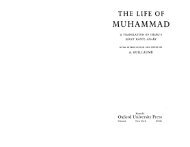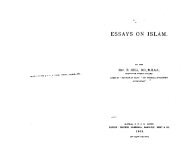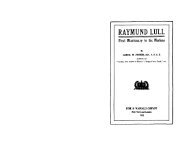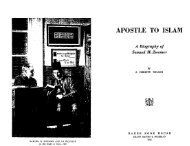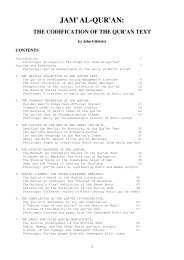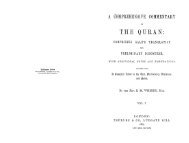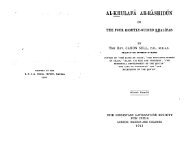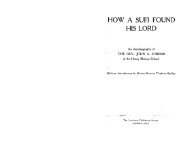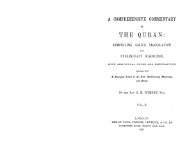Islam Its Belief and Practices - Radical Truth
Islam Its Belief and Practices - Radical Truth
Islam Its Belief and Practices - Radical Truth
You also want an ePaper? Increase the reach of your titles
YUMPU automatically turns print PDFs into web optimized ePapers that Google loves.
112 ISLAM ITS BELIEFS AND PRACTICES MARRIAGE AND DIVORCE 113<br />
due; for there is no crime in you about what ye agree<br />
between you after such lawful due, verily, God is knowing<br />
<strong>and</strong> wise." Sura 4: 28.<br />
According to the Imamiyya Code of Jurisprudence,<br />
the following are the conditions of Mut'a. There must<br />
be declaration <strong>and</strong> acceptance, as in the case of Nika1;J.,<br />
<strong>and</strong> the subject of the contract must be either a Muslima,<br />
a Christian, or a Jewess; she should be chaste, <strong>and</strong> due<br />
inquiries should be made into her conduct, as it is abominable<br />
to enter into contract with a woman addicted to<br />
fornication, nor is it lawful to make such a contract with<br />
a virgin who has no father. Some dower must be specified,<br />
<strong>and</strong> if there is a failure in this respect, the contract<br />
is void. There must also be a fixed period, but its extent<br />
is left entirely to the parties; it may be a year, a month,<br />
or a day, only some limit must be distinctly specified, so<br />
as to guard the period from <strong>and</strong> extension or diminution.<br />
The practice of 'azl (extrahere ante emissionem seminis) is<br />
lawful, but if, notwithst<strong>and</strong>ing this the woman becomes<br />
pregnant, the child is the temporary husb<strong>and</strong>'s; but if he<br />
should deny tbe child the denial is sustained by the law.<br />
The teaching of the Sunni Code of Jurisprudence is<br />
as follows:<br />
"A Mut'a, or usufructuary marriage, where a man<br />
says to a woman, 'I will take the use of you for such a<br />
time for so much,' is void." "A Nika1;J.u'l-muwaqqat or<br />
temporary marriage,-where a man marries a woman,<br />
under an engagement of ten days (for instance) in the<br />
presence of two witnesses,-is null."<br />
The Religious Ceremony.<br />
.The Muslim law appoints no religious ceremony, <strong>and</strong><br />
in all cases it is left to the discretion of the Qadi. The<br />
following is the common order of performing the ceremony.<br />
The ceremony never takes place in a mosque.<br />
The Qaqi, the bridegroom, <strong>and</strong> the bride's attorney, with<br />
the witnesses assemble in some convenient place <strong>and</strong> make<br />
arrangements as to the amount of dower. The bridegroom<br />
then repeats after the Qadi the following:-<br />
1. The Istighfiir, the prayer of forgiveness: "I desire<br />
forgiveness from God of all my sins...<br />
2. The chapters of the Qur'an commencing with the<br />
word Qui, say, viz., 109, 112, 113, 114. These are in<br />
no way connected with the subject of marriage, but<br />
are often used for magical purposes.<br />
3. The Kalima : "There is no god but Allah, <strong>and</strong><br />
Mu1;J.ammad is His apostle. "<br />
4. The Iman, the Muslim Creed.<br />
The bride's attorney takes the h<strong>and</strong> of the bridgroom<br />
<strong>and</strong> is requested by the QaqI to say: .. I marry to thee<br />
the daughter of such an one (or my daughter) for a dowry<br />
of such <strong>and</strong> such an amount in the presence of two<br />
witnesses; do you consent to it?" The bridegroom thereon<br />
says: .. With my whole heart <strong>and</strong> soul, to my marriage<br />
with this woman, as well as to the dower settled upon her,<br />
I consent, I consent, I consent...<br />
After this the Qiiqi raises his h<strong>and</strong>s <strong>and</strong> recites some<br />
such prayer as: .. 0 great God r grant that mutual love<br />
may reign between this couple, as it existed between<br />
Adam <strong>and</strong> Eve, Abraham <strong>and</strong> Sarah, Joseph <strong>and</strong> Zulaykha,<br />
Moses <strong>and</strong> Zipporah, Mu1;J.ammad <strong>and</strong> 'Ayisha, <strong>and</strong> 'Ali<br />
al-Murtaqa <strong>and</strong> Fiitimatu'z-Zuhra. "<br />
Divorce.<br />
Taliiq, or Divorce, literally, means dismissal; in law it<br />
signifies the dissolution of a marriage, or the annulment<br />
. of its legality, by certain words. Divorce is of two<br />
kinds:-<br />
(1) Taliiqu's-Sunnat, Divorce according to the Sunnat,<br />
that is the divorce executed in the manner recom-



